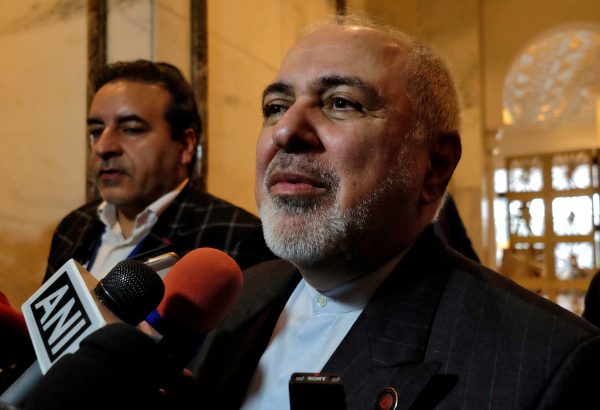Iran is significant for India’s energy security and India’s connectivity plans in Afghanistan and Eurasia. The International North–South Transport Corridor (INSTC) has the potential to boost India’s trade with Eurasia through ship, rail and road infrastructure. India’s economic interests in Iran also include investments in Iran’s oil and gas sector and the development of Chabahar port in the Southeast of Iran.
Iran recently increased its uranium enrichment beyond the threshold of the Iran nuclear deal, enabling the country to produce a single nuclear weapon in three to four months. This comes at a time when the Trump administration is still pushing for a ‘new deal’ with Iran. But some experts view Iran’s actions as calculated to put pressure on the United States and European governments rather than pushing for a bomb in and of itself.
The simmering confrontation between Washington and Tehran came to blows in March when the United States launched several air strikes in Iraq against pro-Iranian militias after a rocket attack killed two US soldiers. Washington unsurprisingly imposed more sanctions on Tehran.
All of this gives ample reason to fear the United States may further extend sanctions to other areas of trade and investment, potentially jeopardising India’s economic and geopolitical interests in Iran.
The personal chemistry between Indian Prime Minister Narendra Modi and US President Donald Trump will not help India mitigate the impact of US sanctions. India’s friendship with the United States may not come with benefits. The most recent instances of the limitations of the Modi–Trump relationship include the failed trade agreement between India and the United States, coupled with Washington’s termination of India’s preferential trade status.
At the same time, India’s relationship with the United States has exposed fault lines in India–Iran relations. India has tried to balance its relations with the United States and Iran since the India–United States Civil Nuclear Agreement in 2005. But India’s bilateral relations with Iran stumbled over the agreement, which Tehran claimed undermined the ‘universality’ of the Nuclear Non-Proliferation Treaty. Relations improved after the Joint Comprehensive Plan of Action (JCPOA) signed between Iran and the P5+1 countries (China, France, Russia, the United Kingdom, the United States, Germany and the European Union) in 2016.
But under the Trump administration, India’s tilt towards the United States has once again become a source of tremendous friction in India–Iran bilateral relations. Iran’s strongly worded statements criticising India’s recent domestic policies and increasing violence against Muslims are a case in point. Iranian MP Naqavi Hosseini stated that India is ingratiating itself with the US through anti-Muslim violence after Trump’s visit to India.
The US–Iran rivalry is a stress-test for India’s Middle East policy that rests on a delicate balance between the Arab Gulf states, Israel and Iran. If increasing tensions boil over into prolonged political instability, India’s strategic and economic interests might be heavily impacted. The Middle East is the main source of India’s energy and remittances from a diaspora of around 8 million Indians working in the Gulf.
The severe outbreak of COVID-19 in Iran further intensifies the challenge faced by India. By toeing Trump’s line, New Delhi largely remains a spectator in Iran’s struggle against the outbreak. This is despite Tehran officially seeking assistance from New Delhi. On the other hand, China has denounced US sanctions and proceeded to help Iran.
By remaining silent in the hour of a severe humanitarian crisis unleashing itself on Iran, India is taking a side in the conflict between the United States and Iran. This is what India has been cautious about all these years, and which it has avoided thanks to a large extent by pursuing the principle of strategic autonomy.
The continuing confrontation between Washington and Tehran is of deleterious consequence for India as it tries to manage its relations with Iran. Washington’s further tightening of sanctions on Iran despite the COVID-19 outbreak demonstrates its commitment to its ‘maximum pressure’ campaign and the renewed friction between the two countries.
Caught in a state of protracted uncertainty, the prospect of further confrontation between Iran and the United States remains high, at least during the Trump era. Whether New Delhi likes it or not, it has to navigate these troubled waters by recalibrating its strategy and accounting for the impact sanctions might have on its economic and strategic interests.
Muhsin Puthan Purayil is a PhD candidate in Political Science at The University of Hyderabad, India.


India’s relations with Iran have definitely taken a course away from traditional. For India, friendship with the US is better suited than any other axis because by maintaining a Strategic
Partnership with the USA and its allies India ensures rewriting its energy as well as all other important security paradigm, besides promising a more responsible role as a global power. Both India and Iran are responsible powers. None of the two countries would commit a tactical mistake in relations. Therefore, one may conclude, that India is well ensconced in its international relations. There is nothing to panic about India’s US policy. This article is also at faults in its understanding the dynamics of India’s relations with the Arabian states and Iran.
India is losing it’s soul for economic gain. Would that be called ‘political prostitution’?